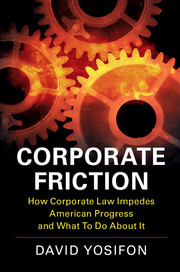Book contents
- Corporate Friction
- Corporate Friction
- Copyright page
- Dedication
- Contents
- Acknowledgements
- Introduction
- 1 Apologies for Our System
- 2 Critique of Shareholder Primacy
- 3 The Citizens United Gambit in Corporate Theory
- 4 The Actual Law of Corporate Purpose
- 5 Corporate Patriotism
- 6 Corporate Law and the Confusions of Consumer Culture
- 7 Foreign Models of Corporate Governance
- 8 A Socially Responsible Corporate Governance Standard
- Conclusion
- Index
3 - The Citizens United Gambit in Corporate Theory
Published online by Cambridge University Press: 30 April 2018
- Corporate Friction
- Corporate Friction
- Copyright page
- Dedication
- Contents
- Acknowledgements
- Introduction
- 1 Apologies for Our System
- 2 Critique of Shareholder Primacy
- 3 The Citizens United Gambit in Corporate Theory
- 4 The Actual Law of Corporate Purpose
- 5 Corporate Patriotism
- 6 Corporate Law and the Confusions of Consumer Culture
- 7 Foreign Models of Corporate Governance
- 8 A Socially Responsible Corporate Governance Standard
- Conclusion
- Index
Summary
- Type
- Chapter
- Information
- Corporate FrictionHow Corporate Law Impedes American Progress and What to Do about It, pp. 41 - 59Publisher: Cambridge University PressPrint publication year: 2018



